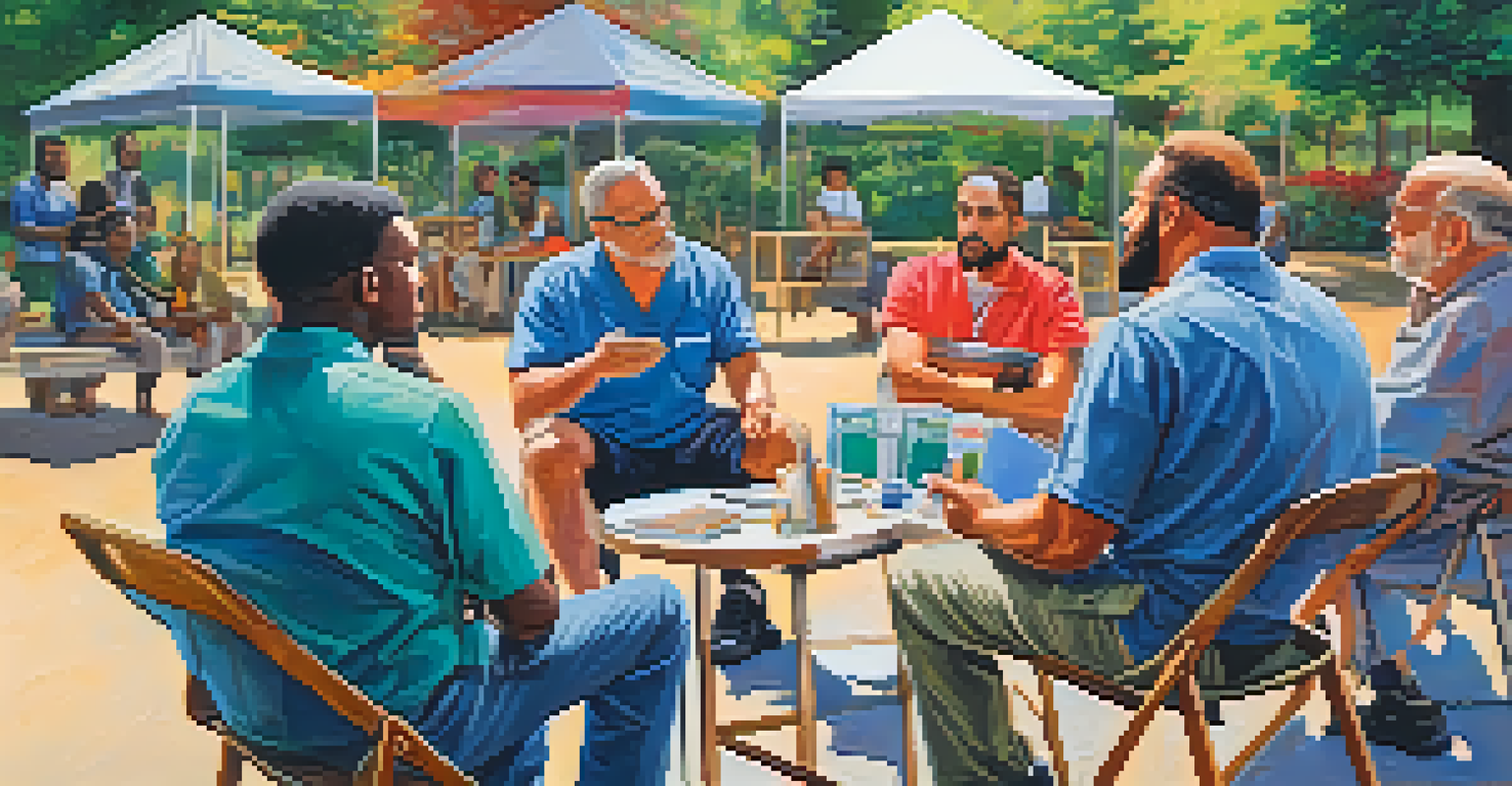Men's Health Advocacy: How to Support Health Initiatives

Understanding Men's Health and Its Unique Challenges
Men's health encompasses a range of physical and mental issues that often go unaddressed. Factors like societal expectations and stigma can prevent men from seeking help, leading to serious health complications. Recognizing these challenges is the first step towards advocacy, as it helps in tailoring initiatives that resonate with men's specific needs.
The greatest weapon against stress is our ability to choose one thought over another.
For instance, conditions like prostate cancer, heart disease, and mental health disorders disproportionately affect men, yet awareness remains low. This gap in knowledge can be filled through educational programs that highlight these issues. By bringing attention to the statistics and stories behind men's health, we can motivate communities to engage in advocacy efforts.
Moreover, understanding the cultural context that shapes men's health perceptions is crucial. Many men grow up hearing that vulnerability is a weakness, which can discourage them from discussing health concerns. Addressing these cultural barriers is key to fostering an environment where men feel comfortable seeking help and support.
The Role of Community in Men's Health Advocacy
Community plays a vital role in promoting men's health initiatives. Local organizations can create safe spaces for discussions about health challenges and solutions. By fostering a sense of belonging, communities can encourage men to voice their concerns and share experiences, leading to collective action.

For example, support groups can provide invaluable peer support, allowing men to connect and learn from one another. These gatherings can transform into powerful movements, advocating for better access to healthcare and resources. When men see others sharing their struggles and triumphs, it can inspire them to take charge of their health.
Additionally, community events like health fairs or workshops can raise awareness about men's health issues. Such initiatives not only educate but also promote preventive measures. By engaging local health professionals, communities can offer screenings and resources, bridging the gap between men and the healthcare system.
How to Get Involved in Men's Health Initiatives
Getting involved in men's health initiatives can start with small steps that lead to significant impact. You might volunteer with local organizations that focus on men's health or participate in awareness campaigns. Every bit of effort contributes to a larger movement, showing that you care about the well-being of your community.
Men's health is not just about the absence of disease; it's about the presence of well-being.
Another way to contribute is by spreading the word through social media. Sharing articles, statistics, and personal stories can help raise awareness among your friends and followers. Social media platforms can serve as powerful tools for advocacy, connecting like-minded individuals who share a passion for men's health.
Lastly, consider hosting or attending events that promote men's health. Whether it's a charity run, a seminar, or a casual get-together, these activities can foster connections and create a supportive environment. Engaging in these initiatives not only benefits your health but also encourages others to prioritize their well-being.
Advocating for Policy Changes in Men's Health
Policy changes can create a significant impact on men's health initiatives. By advocating for better healthcare access and funding for men's health programs, individuals can help shape a healthier future. Engaging with local representatives and voicing concerns can lead to policy shifts that prioritize men's health needs.
For example, advocating for mental health resources specifically tailored for men can lead to more comprehensive support systems. This might include increased funding for counseling services or workshops that address men's unique mental health challenges. When policies reflect the needs of men, it encourages better health outcomes.
Furthermore, becoming involved in advocacy groups that focus on men's health can amplify your voice. These organizations often have established networks and resources to push for change effectively. Joining forces with others who share your passion can enhance the impact of your efforts, making your advocacy more powerful.
Educating Young Men About Health Awareness
Education is a cornerstone of effective men's health advocacy. By teaching young men about health issues early on, we can empower them to take charge of their well-being. Schools and community programs can play a pivotal role in disseminating information about nutrition, mental health, and preventive care.
For instance, incorporating health education into school curriculums can help normalize discussions about men's health. Workshops and seminars led by healthcare professionals can provide valuable insights and encourage students to ask questions. This proactive approach can dispel myths and promote healthier habits from a young age.
Moreover, mentorship programs can connect young men with role models who prioritize health. These relationships can foster open dialogues about health concerns and encourage young men to seek help when needed. By building a foundation of knowledge and support, we can create a generation that values health and well-being.
The Importance of Mental Health in Men's Health Advocacy
Mental health is often overlooked in discussions about men's health, yet it plays a crucial role in overall well-being. Advocacy efforts must include mental health awareness to address the unique challenges men face. Stigma surrounding mental health can prevent men from seeking help, making it essential to promote open conversations.
Initiatives like 'Movember' have successfully raised awareness about men's mental health issues. By encouraging men to share their experiences and seek help without fear of judgment, we can break down barriers. These campaigns serve as powerful reminders that mental health is just as important as physical health.
Furthermore, integrating mental health resources into general health initiatives can create a holistic approach to men's health. This might include providing access to counseling services at community health events. By normalizing mental health discussions, we can foster a culture where seeking help is seen as a strength rather than a weakness.
Celebrating Successes in Men's Health Initiatives
Celebrating successes within men's health initiatives is vital for sustaining momentum. Acknowledging progress, whether big or small, can inspire continued efforts and partnership. Success stories can motivate others to get involved and remind everyone of the positive impact advocacy can have.
For example, recognizing community leaders who have made significant contributions to men's health can set a benchmark for others. Highlighting their achievements through social media or local events can create role models for future advocates. When individuals see their peers making a difference, it encourages them to join the cause.

Moreover, sharing success stories can raise awareness about the importance of men's health initiatives. This could be in the form of testimonials from those who have benefited from programs or campaigns. By showcasing tangible results, we can rally more support and participation in future initiatives.